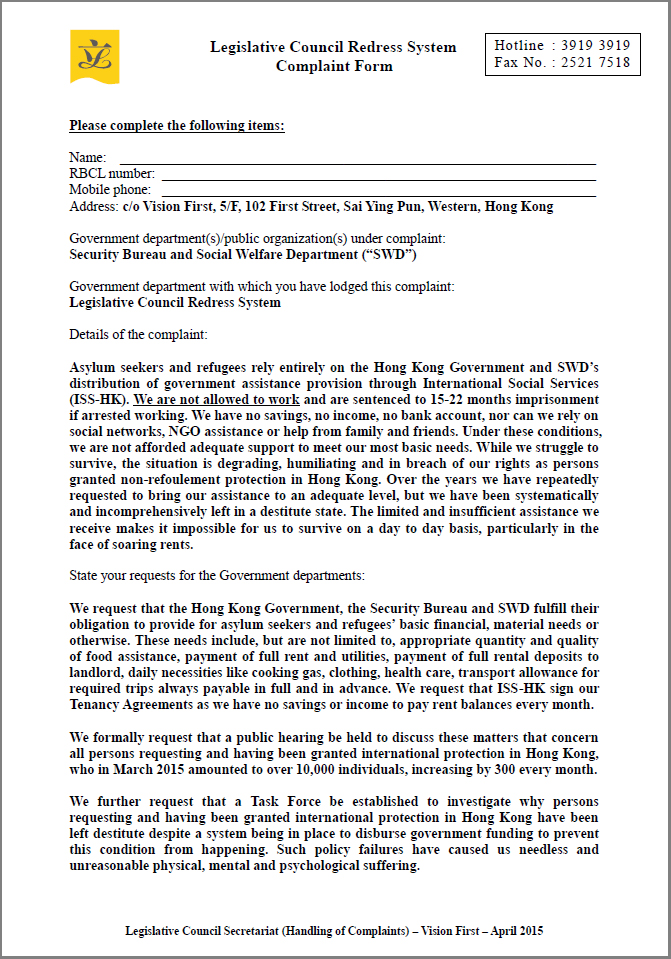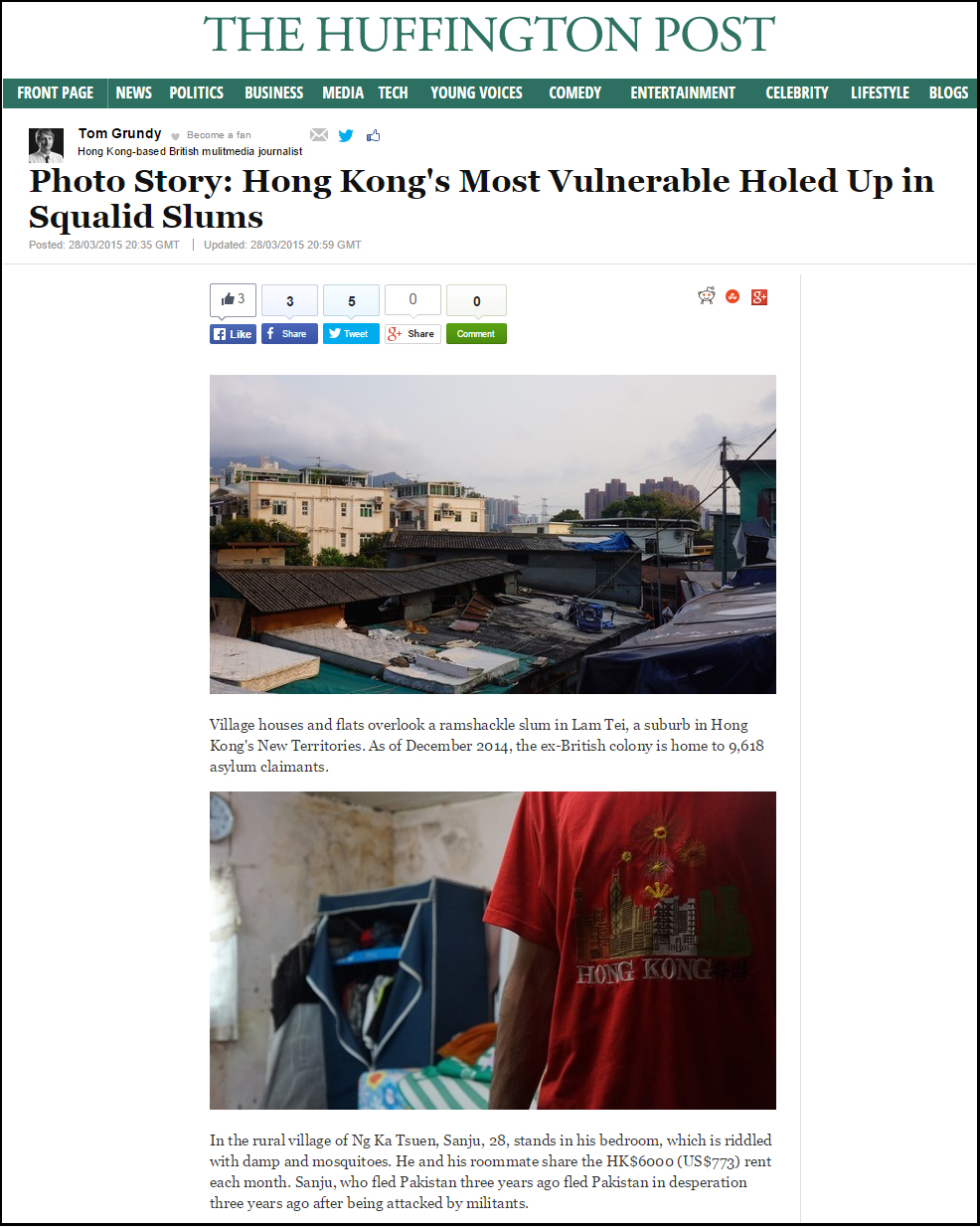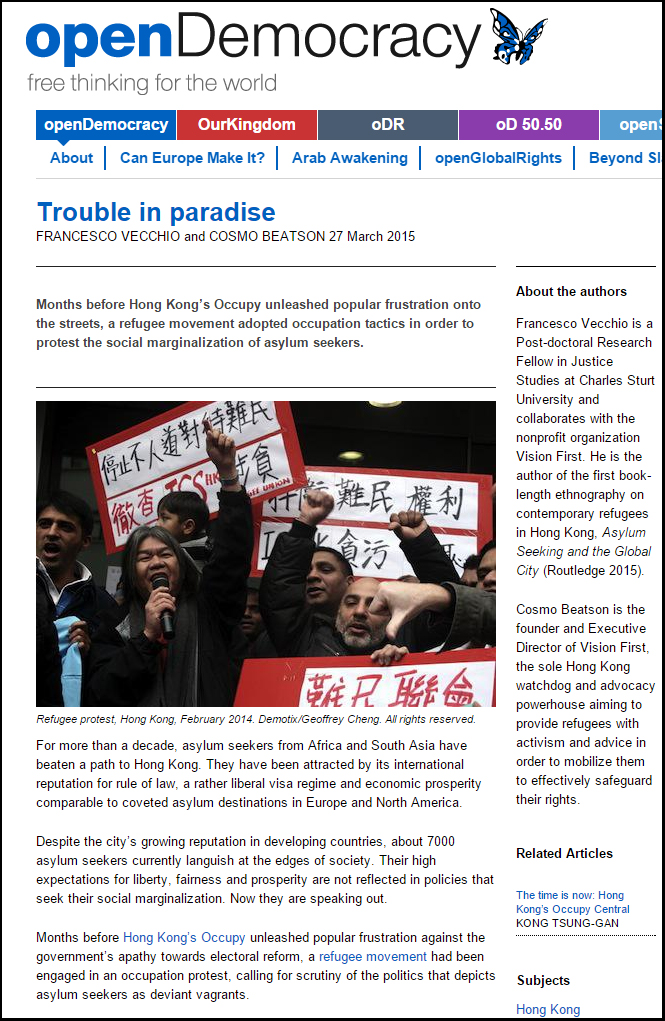Is the government promoting “no welfare – no work” entrapment?
Apr 20th, 2015 | Crime, Detention, Immigration, VF Opinion, Welfare | Comment
Called to the stand in Shatin Magistracy, Mohammed faced charges of breaching conditions of stay by taking up employment unlawfully. With the assistance of a Hindi interpreter, the despairing 50 year-old listened carefully before entering a plea – NOT GUILTY!
Asylum seekers are most commonly tarred with one brush. Public opinion is almost unanimous in accusing them of beating a path to our city to fraudulently drink in its riches by abusing welfare assistance, or toiling in the underground economy. Obfuscating the truth, the authorities regularly promote to the inattentive a rejection rate of 99.9% as evidence that only 1 in 1000 claims is meritorious.
The government remains unyielding and is adamant that the asylum mechanism offers genuine claimants a fair chance. No explanation is given about cases that have been pending for years often stretching to a decade. At the other end of the spectrum are recent arrivals who presumably didn’t expect to suffer like beggars after lodging protection claims with the Hong Kong Government.
Everything was better in Mohammed’s life before he took refuge in our city. If he didn’t face danger, he wouldn’t have left behind a supportive wife and adult children, abandoning a comfortable home and a thriving family business. At half a century of age, he hardly fits the stereotype of an adventurer seeking a better life in a developed country where illegal work might support remittances home.
One night, a few months after being released from Immigration detention, Mohammed regained consciousness in a ward at Queen Elizabeth Hospital. “I didn’t know how I got there. I was feeling ill that morning as I hadn’t had anything to eat and I was exhausted by sleeping outside week after week. The nurse told me that I had hit my head when I collapsed in the street. An ambulance was called and I was admitted to hospital for three days until I recovered.”
Holding back tears, he finds it hard to continue, “Those were the only three days when I ate properly since I was released from CIC. The nurses gave me extra food to make me stronger. For several months before I only ate what shops donated to me in Chung King Mansions. It was never enough. I lost a lot of weight and was often sick. I was worried when discharged from hospital as I knew I would be hungry.”
Mohammed reported that he had registered at the Social Welfare Department and had been referred to ISS-HK, but nobody called him for months. He forgets how long it was because several months passed in a blur of destitution, begging for handouts, sleeping in the streets, falling sick and depressed and always struggling with hunger. As if life couldn’t get more distressing, it did.
One Ramadan afternoon before the Zuhr prayers, he was accosted by a faithful at the Kowloon mosque who, presumably noticing his grime state, inquired about his condition. Mohammed explained that he was a refugee and had long run out of money and support. The well-wisher showed concern and with the enticement of a ‘breaking fast meal’ invited him on a trip in a private car to a recycling yard in Lok Ma Chau. The arrangement did not raise the suspicions of a newcomer in an international city.
Beggars can’t be choosers and nothing seemed out of the ordinary for hungry Mohammed about Muslim faithful offering desperately needed support in the name of Zakat – charity being one of the five pillars of Islam and a special obligation during Ramadan. Nobody suspected that police commandos were concealed in nearby bushes cocking machine guns to raid the isolated yard.
Around 3:30pm, before Mohammed enjoyed a single morsel of food, armed police burst inside. In the ensuing chaos, the panic-stricken refugee dove inside a wrecked car hugging the rusty floor until he was dragged out by the collar of his jacket two hours later, sweaty and confused. The fact that he was hiding from enforcement agents was subsequently put forward as evidence of his guilt.
Mohammed stands accused of working illegally. The police took photos of those arrested after the raid, not when they were allegedly working. The threadbare clothes of a homeless existence were put forward as work clothes, though Mohammed had arrived an hour earlier and his hands were clean.
It is certainly possible that Mohammed is lying and had accepted an offer for work at a time of acute desperation. Perhaps Mohammed is afraid of admitting the truth for fear of being jailed for 15 months for working illegally. Perhaps it wasn’t the first time he went to that yard and the police had failed to take such photo. But he claims to be innocent. And this arrest consequently raises more questions than answers.
How much of a crime is it to steal bread when you are hungry? How are refugees expected to survive for weeks and months before receiving welfare? For that matter, refugees are trapped between inadequate assistance and cope without breaking the law. Is the government promoting “no welfare – no work” entrapment? In some jurisdiction offenders may be found innocent when authorities use deception to make arrests. Shouldn’t the courts take note of contextual evidence?
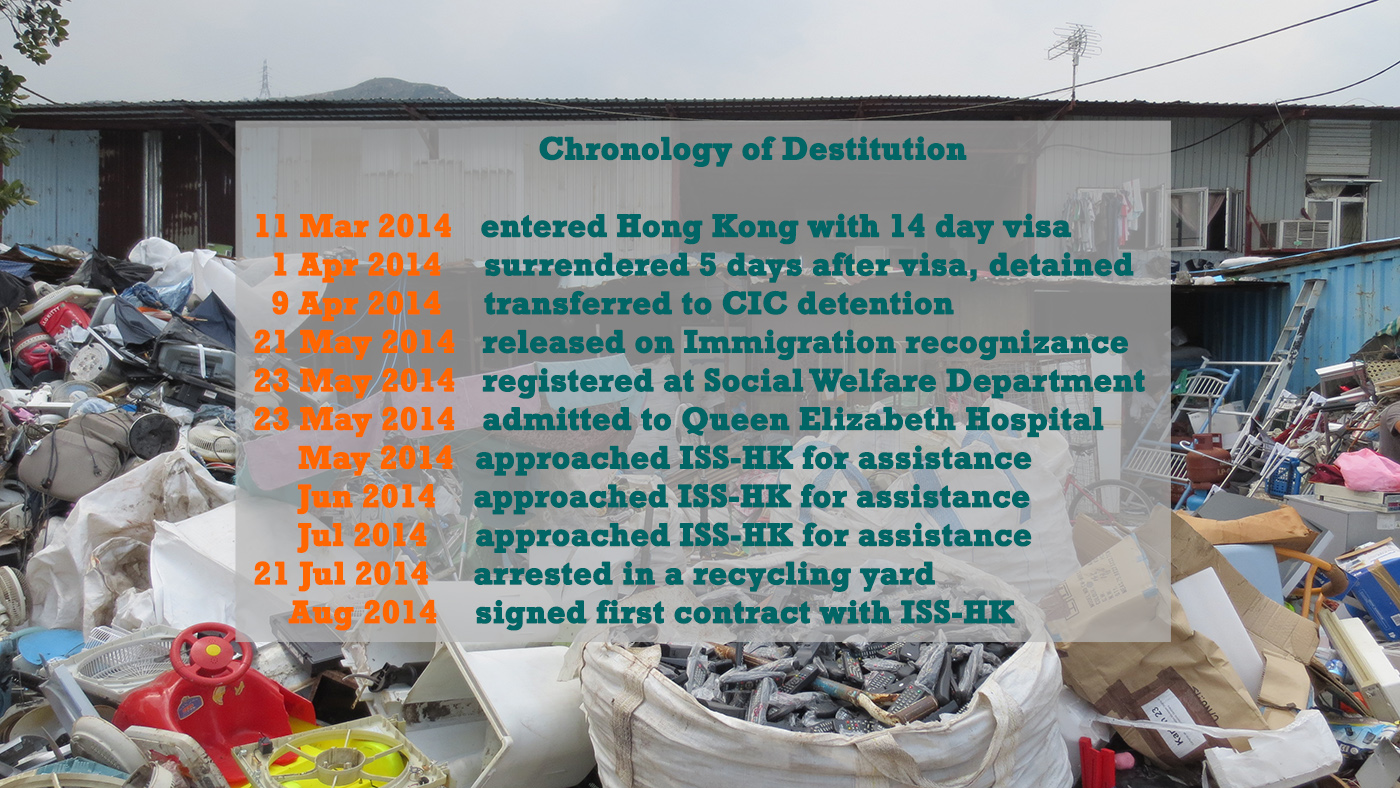
Residual welfare is formulated to entrap refugees
Apr 15th, 2015 | Crime, VF Opinion, Welfare | Comment
In pre-industrial, agrarian society the needs of the vulnerable were generally met by family, kinship provisions, neighbourhood, informal support networks, religious institution and the charity of the rich based on normative values of empathy, mutual help, locality ties and religious beliefs. The state offered no institutional assistance.
In modern times, these informal arrangements were admirably taken over by the state in the interest of “those who are not capable without help and support of standing on their own feet as fully independent or self-directing members of the community”. It was understood that “welfare addresses social needs accepted as essential to the well-being of a society. It focuses on personal and social problems, both existing and potential.” (HK Gov 1965 + 1991 White Papers).
Nonetheless, with 1.5 million citizens living in poverty, and thousands more struggling to afford three square meals a day, the Hong Kong welfare model is often considered an embarrassment. The administration falls short of fully mobilizing its considerable resources to alleviate the emotional and economic suffering of its most vulnerable citizens.
In reality, scholars tend to see local welfare as a residual system. That is welfare that only partly ameliorates the failures of the market economy, precisely because the privileges of the rich in society should not be undermined by a burdening tax system that is claimed would inevitably become needed were more services needed by larger numbers of welfare claimants.
After decades neglecting refugees, the government provided welfare in 2006. But the authorities persistently reiterate the service is “to prevent destitution while not creating a magnet effect which may have serious implications for the sustainability of our current support systems and for our immigration control.” In other words, this is another form of residual welfare.
But here is the catch. Uprooted from family, kinship and locality ties, refugees in Hong Kong are displaced and deficiently assisted by support networks, institutional services and charitable organizations. The assistance levels provided by the government condemn them to dire poverty that is compounded by the denial of work rights and 15 months imprisonment for those arrested working.
As opposed to a solidarity model based on principles of mutual responsibility, a residual welfare model offers a partial safety net confined to those who are unable to manage otherwise, with the assumption that they are able to locate further sources of assistance on their own. This notion then suggests that 10,000 refugees in Hong Kong ought to supplement inadequate government assistance through hand-outs from family, countrymen, neighbours, religious institutions and NGOs … or by working illegally.
Policies directed against the poor have to do with the government abdicating its duty to alleviate distress and poverty, as much as with crafting a hostile environment in which an undesirable foreign class adapts by resorting to all sorts of social tricks and risking arrest for doing something illegal because they have no choice. A case in point is a refugee who already has 5 convictions for theft. He candidly explains, “I steal baby formula because easy to sell. If police arrest me I go prison 2 to 3 months. If I am arrested working I will go prison for 2 years because of prior convictions.”
The expectation of self-reliance from refugees who frequently don’t know a soul in town is absurd. They report the absurdity of the residual welfare system through suggestions commonly made by their case workers:
– “You must wait 2 to 3 months before we start the assistance.”
– “We cannot help you. You must find the money yourself.”
– “You should ask some NGO to pay for or donate what you need.”
– “You should ask your friends to help you pay for it.”
– “You should find some church to assist you.”
– “This is not our problem. You must manage by yourself.”
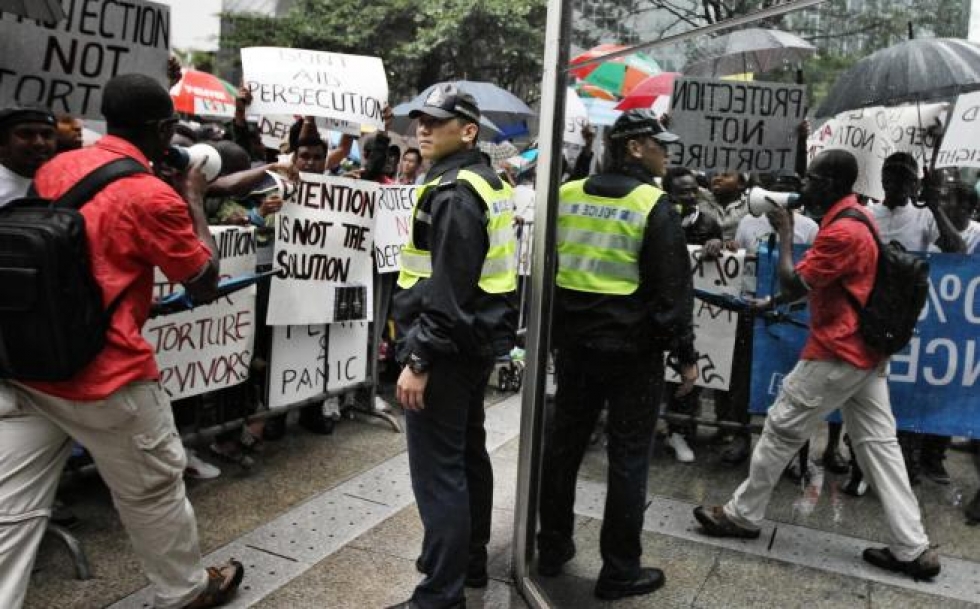
Foreign Domestic Workers and Pregnancy
Apr 10th, 2015 | Immigration, Legal, Media, Welfare | Comment
Foreign Domestic Workers & Pregnancy Pt. 1 (TVB Pearl)
Foreign Domestic Workers & Pregnancy Pt. 2 (TVB Pearl)
Refugees suffer a contaminated service mindset
Apr 3rd, 2015 | Food, VF Opinion, Welfare | Comment
The big picture is one of government policies crafted to punish individuals for seeking asylum and encourage their departure. The justifications of ‘avoiding the creation of a magnet effect’ and ‘preventing the opening of flood-gates’ are cunningly raised to stoke fears and draw support for the current treatment that borders on social cleansing.
Propaganda brainwashes the minds and pollutes the hearts of gullible citizens who unwittingly (or not) are imperceptivity conditioned to homogenize refugees’ narratives and motives into an amalgam rich with xenophobia and poor in human rights. This reduces refugees to an annoying inconvenience for otherwise comfortable residents, some of whom might make a living in the asylum field.
On 2 April 2015, two refugee women reported recent experiences with service providers who used a malicious tool to abuse and deprive them of respect – words. Both were women, both were mothers, both were gentle and soft-spoken and unlikely to kick up a storm in protest, which conditions demand we listen carefully to their complaints.
A South Asian mother of one, complained to her case worker (name withheld) about the quality of food collections. She expressed her views politely, requesting improved provisions that were not always the cheapest available. The mother lamented that foodstuff for children had little nutritional value and lacked variety. She said she was told: “Why you complain? It is free! You should be happy with what you get for nothing.”
An African mother of three, reported to her case worker that some food was contaminated. A Ziploc bag containing a box of macaroni was produced as evidence. The package was home to two undesirable creatures, one dead and one alive – cockroaches! The case worker presumably handled the issue with the grocery shop concerned. At the next food collection the mother had another unpleasant surprise. Instead of an apology, she received threats. She said she was told: “Why you give me trouble? Did I give you trouble? So now you want trouble for your family?”
Refugees need not be treated as high-value customers at some luxury shop. Yet they are customers nonetheless. Case workers earn salaries to perform a welfare job on behalf of the Hong Kong people. They need not be grateful, but they ought to be respectful. It is hoped more emphasis will be placed on professionalism that might build understanding and ultimately improve services.
The shopkeepers and owners of the seven grocery shops appointed by ISS-HK run profitable businesses. They are not doing charity by any means. Presumably they earn a decent profit on every item sold, including the contaminated box of macaroni. The outcome might have been different if the package had been given to the Food and Environmental Hygeine Department (FEHD), which Vision First advises refugees to approach in such cases.
Why should refugees be intimidated when raising legitimate complaints? Why should a mother be targeted for reprisal for speaking out?
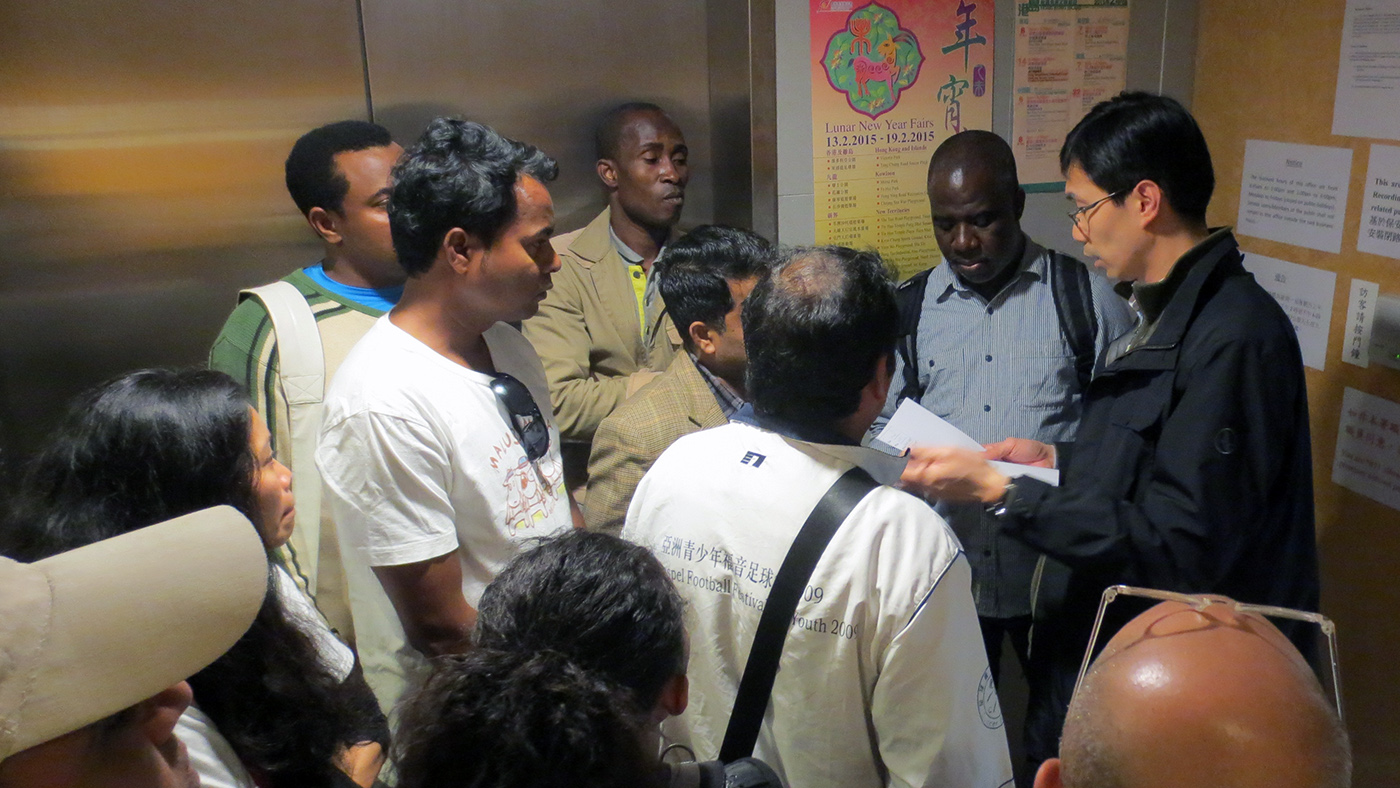
Did child services fail Precious?
Apr 2nd, 2015 | Food, Housing, VF Report, Welfare | Comment
Is it right for a government contractor, financed by hundreds of millions of dollars from the Social Welfare Department, to transfer a 3 year-old child into the care of a destitute refugee woman without adequate support? What if the woman met the girl only a few days earlier?
Several months ago Vision First raised a complaint with SWD about a little girl who showed up at our office unwanted by the refugee carers who were stuck with her after the mother was jailed for 18 months for working illegally, possibly to raise a daughter in this expensive city.
Presumably the SWD has operating procedures for its child services department tasks to provide assistance for young children whose parents are incarcerated and who, after the age of 3, are no longer allowed to stay in prison with a parent. This is what happened to Precious.
Two refugee friends of the incarcerated mother anxiously sought our assistance and we raised our concerns with the SWD, as we didn’t have resources to care for children, particularly of such a young age without parents. The women complained that ISS-HK had entrusted them with Precious without providing adequate assistance to look after and care for her day and night.
Last week a third refugee mother produced an ISS-HK document stating, “This care giving agreement is made out of good will and compassion to the child as there is no other person or institution that can look after the child while her mother is restricted to provide care and custody in view of detention. This agreement includes care giving to the child, collection of her food … accessing health care facilities when the child needs medical treatment, escorting child in reporting to ISS-HK for contract renewal.”
The agreement fails to mention the countless tasks a parent performs in child-care: cooking, cleaning, bathing, clothing, playing, talking, teaching, putting to bed … and generally paying full attention to the wellbeing and happiness of children. Any parent will agree that caring for children is a never-ending obligation typically performed at great personal sacrifice.
Why was Precious entrusted to a refugee women she had never met before? Assuming the women is wonderful (she is), is it right for a child to live in a tiny partitioned room without ventilation, kitchen, bathroom or even a functioning TV? Is the women expected to cook, bath and cloth and share a single bed with a little girl who is not her daughter? Is she expected to provide motherly care as a destitute refugee without financial assistance? How can the women travel on her daily routine without even a child Octopus card?
Would this be an acceptable treatment for resident children in the care of SWD?
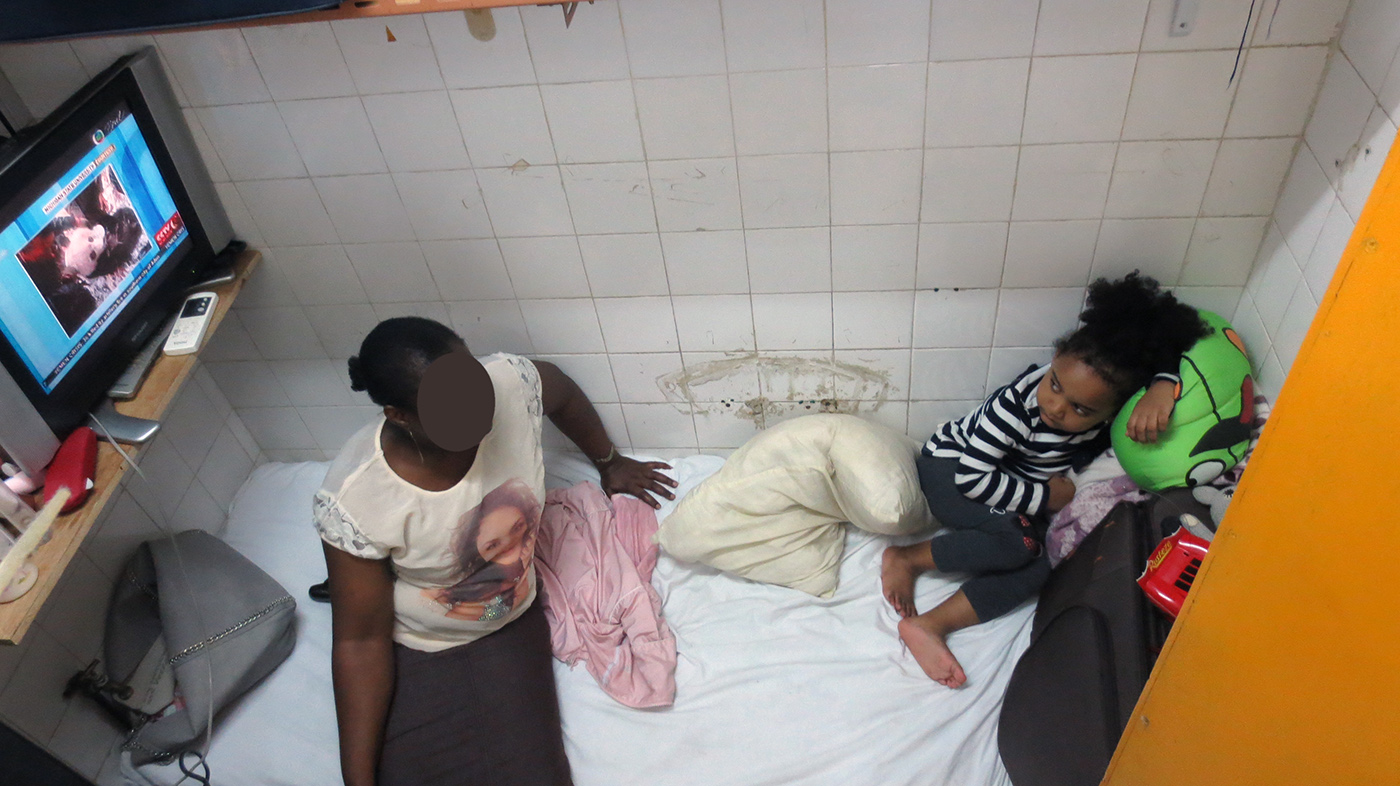
Complaint to the Legislative Council Redress System
Apr 1st, 2015 | Advocacy, Food, Housing, Legal, VF updates, programs, events, Welfare | Comment
Asylum seekers and refugees rely entirely on the Hong Kong Government and Social Welfare Department (“SWD”) distribution of government assistance provision through International Social Services (ISS-HK). They are not allowed to work and are sentenced to 15-22 months imprisonment if arrested working. They have no savings, no income, no bank account, nor can they rely on social networks, NGO assistance or help from family and friends. Under these conditions, they are not afforded adequate support to meet their most basic needs. While they struggle to survive, the situation is degrading, humiliating and in breach of their rights as persons granted non-refoulement protection in Hong Kong. Over the years they have repeatedly requested to bring their assistance to an adequate level, but they have been systematically and incomprehensively left in a destitute state. The limited and insufficient assistance they receive makes it impossible for them to survive on a day to day basis, particularly in the face of soaring rents.
Vision First request that the Hong Kong Government, the Security Bureau and SWD fulfill their obligation to provide for asylum seekers and refugees’ basic financial, material needs or otherwise. These needs include, but are not limited to, appropriate quantity and quality of food assistance, payment of full rent and utilities, payment of full rental deposits to landlord, daily necessities like cooking gas, clothing, health care, transport allowance for required trips always payable in full and in advance. We request that ISS-HK sign the Tenancy Agreements as refugees have no savings or income to pay rent balances every month.
We formally request that a public hearing be held to discuss these matters that concern all persons requesting and having been granted international protection in Hong Kong, who in March 2015 amounted to over 10,000 individuals, increasing by 300 every month.
Vision First further request that a Task Force be established to investigate why persons requesting and having been granted international protection in Hong Kong have been left destitute despite a system being in place to disburse government funding to prevent this condition from happening. Such policy failures have caused refugees needless and unreasonable physical, mental and psychological suffering.
Vision First invites refugees to download and complete the form below that will be filed at the Complaints Office of the Legislative Council Secretariat over the coming weeks and months.
The hidden and dangerous refugee slums of Hong Kong
Apr 1st, 2015 | Housing, Media, Welfare | Comment
The treatment of refugees by SWD can lead to criminal acts
Mar 31st, 2015 | Crime, Food, Housing, Immigration, Legal, Welfare | Comment
Written by Christopher McNulty
It needs to be considered that the way in which Hong Kong’s Social Welfare Department (SWD) treats refugees can lead to refugees committing criminal acts. This will be explained by defining and discussing the criminological theories of opportunity and labelling and explaining how current SWD policies might lead refugees to commit criminal acts.
Opportunity theory can be defined as, “offenders having inadequate or inappropriate means or opportunities to achieve certain goals relative to other people in society” (White, 2014, p. 71). Considering refugees in Hong Kong using this theory, it can be argued that crime is generated by this type of treatment. For example, if refugees don’t have adequate means of living and opportunities to better themselves through education and work, there is a chance they will try to better themselves through ‘illegal’ activities such as work performed without authorization. As reported in the South China Morning Post, “asylum seekers awaiting the outcome of their claim with the Office of the United Nations High Commissioner for Refugees (UNHCR), recognised refugees awaiting resettlement to another country and torture claimants are banned from doing paid or unpaid work” (Chan, 2013).
Looking at this through opportunity theory, it can take years for refugees to be screened and possibly resettle in another country and, while waiting, they cannot work to better themselves and earn money for their family. Using this example there is a likelihood that if a refugee family needed money for rent, food, clothes or the children’s school and if the only way to achieve this was stealing or working illegally, they would have no choice but to commit criminal acts to meet what most people would agree are basic daily needs, in this case, unmet by the SWD.
Labelling theory can be described as society labelling an individual, which in turn can cause the individual becoming influenced by the label and acting out that labelled behaviour (Holmes, 2012, p. 250). It can be argued that refugees can be stigmatised due to the current system and laws in place. For example, refugees can be seen by the Hong Kong public as being dependant on the SWD and not searching for jobs, as they are not aware of the current government policies which prohibit them from working. This type of stigmatization can cause refugees to be always seen by the public as individuals who are content being dependant on welfare and not wanting to work. This can lead to refugees believing social change will never occur and becoming influenced by the label and turn to conducting criminal acts such as theft and working illegally.
In conclusion, as shown through the criminological perspectives of opportunity and labelling, the current policies of the HK SWD can cause refugees to commit criminal acts due to them not enjoying adequate support and being labelled by the general public as continuously dependant on welfare and not looking for employment. To create a stronger relationship between refugees and the government, refugee policy needs to change to minimise the potential of criminal acts being committed by refugees trying to meet rent payments, purchase essential foodstuffs and making ends meet.
Currently in the media:
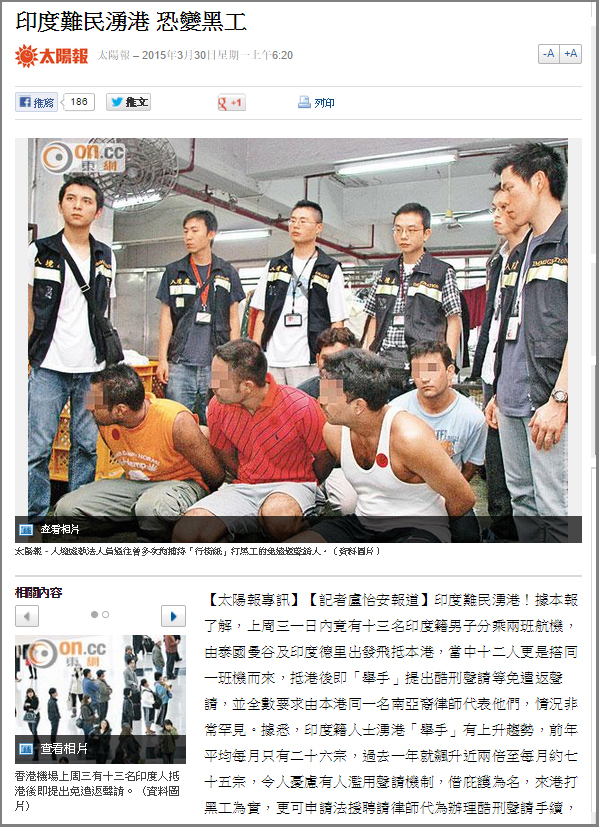
Hong Kong’s most vulnerable holed up in squalid slums
Mar 29th, 2015 | Food, Housing, Media, Welfare | Comment


